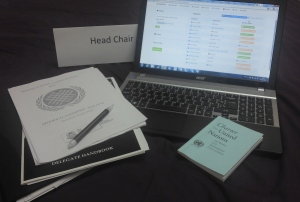
How to Select a Committee Topic: Everyone is Tired of Drones and Ukraine
It’s hard to describe my feelings when I see the array of committee topics on our current MUN circuit. Topics being discussed in Security Council simulations all consist of “Drone Warfare in the Middle East” and “the Uses of Drone Technology”, while DISEC focuses on “the Use of Armed Drones” (all being topics I encountered at conferences myself). Have we run out of things to talk about? Are all of the world’s problems related to drones?
I once questioned my eyesight upon studying a well-estabished European MUN conference’s agenda: “Topic A: The Question of DR Congo. Topic B: The Question of Syria.” So I wonder: how many committees this year will be debating the “Situation in Ukraine”?
I could keep my rant going, but I’ve instead decided to provide solutions for out-of-the-box thinking.
- The topic must be unique.
As I’ve stated, we are pretty tired of discussing drones, Ukraine and Syria, and other cliche agendas. When selecting a topic, try to think of a less obvious one – strike for the topic that has never been discussed in the real UN (or the body simulated by your committee) before. Repeating things that have already been said by someone else will not help delegates to achieve all those things the Secretary General’s like to speak about in opening ceremonies, like “shaping the world’s future”, “becoming leaders of tomorrow”, etc. Not to mention, discussing such typical topics will not attract more delegates to your conference…but it could definitely deter some.
- The topic must outline the issue to be addressed.
Treat the topic like your research paper title. Would you really write a research paper on people’s “Right to Religious Beliefs”? We already have the Universal Declaration of Human Rights, European Convention of Human Rights, lots of case law, etc. defining this very right and acknowledging its existence, so what new is there to be added? Make your topic precise and focus it on a particular aspect – create a separate sub-title within the topic that will point the delegates towards what should be included in the resolution. Therefore “Redefining the Right to Religious Beliefs in the face of Growing Popularity of Atheist Movements” is a more precise topic (but, again, it is not unique and therefore it is doubtfully a good one).
- The topic must be appropriate for your committee.
Make sure you understand the jurisdiction of your committee, which can be tricky at times as many world problems are interrelated.
- The topic complexity must be appropriate for the committee level.
Whilst beginner’s committees should focus on accessible topics, based on information which is easy to find and navigate around. This is particularly pertinent when selecting a popular topic where plenty of information is available, care must be taken as it is a common pitfall for beginner delegates to get lost in the specifics.
- The topic must be in line with a conference theme.
Many conferences set up a general conference theme, so the topic of your committee must somehow align with it. A good example would be the theme of the conference I recently attended: Derailing the War Machine, and the Historical Committee at the conference was simulating the Treaty of Versailles. This was a good match.
- The title must be long enough to state the topic but concise at the same time.

The same rule applies to the things that inspired your topic selection (i.e. “in our changing economic and cultural landscape”) – include it in the study guide, but not the topic name.
- The topic must encourage further research.
The topic must inspire the delegates, so they get personally involved in it and want to know more, rather than researching just enough to copy-paste a position paper and sleep through the debate. This especially applies to technical topics involving figures.
Hopefully, these simple snippets of advice will help to reduce the numbers of “Situation in Ukraine” topics, and we will all benefit from interesting, diverse and most importantly original topics.

